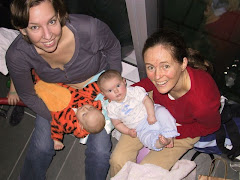Because I live in Tacoma and the bar is in Bellevue, I got a hotel room for the bar and Ray shared it with me. The week before, consumed by stress, we both decided to go a day early so we could try to have a couple of uninterrupted nights' sleep before the exam (something about 3-year-olds and sleep doesn't mix, apparently). Here's how we spent the day before the bar:

Here's a photo from Megan's facebook page -- I certainly didn't have the presence of mind to take a picture, but yes, this is the room where 800 people sweated out the bar for three days:

Afterward we had friends over to our hotel room for champagne. Ray's husband came with her daughters, wearing T-shirts her law firm had made for them:

Friday, I took the kids out for ice cream IN THE MIDDLE OF A WEEKDAY -- scandalous! -- and took this picture, which I emailed to my husband at work to make him jealous. It worked.

Ahh, post-bar life. Nothing to do but clean the house to unearth three years worth of crap, punctuated by trips to the local frozen custard stand. And beer! How I've missed you, beer. Life is good.











